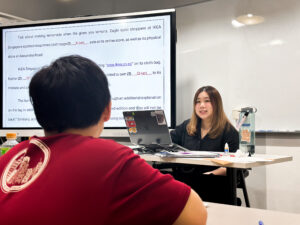Every other month, we gather with a select group of MOE teachers to talk about our students and the latest examination trends set by the Singapore Examination and Assessment Board (SEAB). It was during our most recent get-together last week that we confirmed something surprising we had previously observed.
In addition to your usual suspects like Comprehension Close and Vocabulary Close, Primary 5 and 6 students were also losing a lot of precious Paper 2 marks in the Editing section this year. Students were misspelling words and making mistakes in correcting erroneous grammar.
This is worrying, and it must be put to a stop for your child to score in English. Editing is not a difficult section and can be easily aced if approached in a systematic way. We are going to show you just what we mean.
1. Understand what Editing is testing

The Editing section comprises 12 questions worth a total of 12 marks. 6 questions are dedicated to spelling mistakes and another 6 questions are dedicated to grammatical mistakes. Students are expected to ‘edit’ the mistakes.
When the underlined word in the question is spelt incorrectly, you have run into a spelling mistake. Look at the screenshot of an Editing exercise below.
2. Know how to spot a spelling mistake. Know what to do!
When the underlined word in the question is spelt incorrectly, you have run into a spelling mistake. Look at the screenshot of an Editing exercise below.

Questions 6, 7 and 9 are words that are obviously spelt wrongly, whereas “from” is spelt correctly in question 8. For questions 6,7 and 9, the student’s job is straightforward. They only need to correct the spelling of the word and are not required to change the word or the word form. For example, for question 6, the student just has to spell “recommend” correctly. They do not have to change “recommend” to any other word, or to other word forms such as “recommends”, “recommended”, “recommending” or “recommendation”.
3. Know how to spot a grammatical mistake. Know what to do!
In the same screenshot above, question 8 is a grammatical mistake. Why? Because “from” is spelt correctly. This means that as long as the underlined word is spelt correctly, the mistake will be a grammatical one instead of a spelling mistake. When students encounter grammatical mistakes, their task is to change the word or the word form. In this case, they have to change the word “from” to the correct preposition, “by.”
4. Know how to spell commonly misspelled words
Parents always ask us how they can prepare their children for the spelling mistakes in Editing. There are 2 effective ways for this purpose. First, practice the Editing section from past year exam papers. This is good because school teachers like to test students to spell the same bunch of words. Second, Google “commonly misspelled words.” There will be a number of websites which will give you a list of words. Many of these words frequently get tested in Editing. Here are 10 words teachers simply love to test: Edible Irresistible Occurred / Occurrence Maintenance Aggressive Itinerary Hygiene Rhythm Possession Jewellery.
Here are 10 words teachers simply love to test:
1. Edible
2. Irresistible
3. Occurred / Occurrence
4. Maintenance
5. Aggressive
6. Itinerary
7. Hygiene
8. Rhythm
9. Possession
10. Jewellery
5. Know some commonly tested question types for grammar
In addition to prepositional errors, students will almost certainly be tested on errors in tenses. Let’s look at question 3 in the screenshot below. The word “gave” is wrong because it is in the wrong tense. The correct tense should be present tense because the entire sentence is in present tense such as “you are always there.” As such, “gave” in past tense should be changed to the present tense “give.”

Another commonly tested question type is what we call the “-ing after a comma” rule. For instance, for question 4 above, the correct answer is “guiding” and not “guided.” We make it simple for our students by telling them that when they see a comma right before the underlined word, chances are the word must be corrected to its “-ing” form.
Finally, one of the most commonly tested question types for grammar is the present perfect or past perfect tense which requires students to change the underlined word to its past participle form. For example, for question 5, “be” is in the wrong form because it is not in its past participle form. “Has, have and had” are always paired with a past participle when they are used in the present or past perfect tense. As the past participle form of “be” is “been,” the correct answer is “been.”
These 5 pointers we have given will go a long way to help your child avoid losing unnecessary marks in the Editing section. For more tips and guidance on improving Editing or any other sections, feel free to read the other articles in our blog.
Better yet, join our classes and experience the quality and magic of Think Teach. We devote ourselves to composing success stories. Will your child be next?




